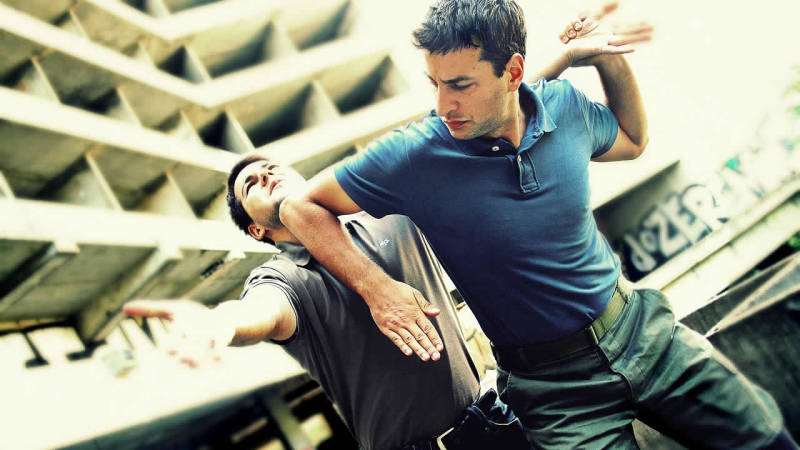
self-defense
Noun
Meaning
Self-defense is a crucial skill in the world of survival, bushcraft, and outdoor activities. It refers to the ability to protect oneself from physical harm or danger. In the context of survival, self-defense techniques are essential for staying safe in the wilderness, where encounters with wild animals or potentially dangerous situations can occur. Knowing how to defend yourself can also be valuable during camping, hiking, or any outdoor adventure. Self-defense techniques include learning martial arts, using self-defense tools, and developing situational awareness. Being prepared to defend yourself is an important aspect of being self-reliant in the great outdoors.

Examples
„I've been practicing self-defense techniques for years, and it has given me the confidence to handle dangerous situations.“
„Self-defense is not just about physical strength, but also about being aware of your surroundings and knowing how to react.“
„When I go hiking alone, I always carry a small self-defense tool with me, just in case.“
„Learning self-defense has taught me how to protect myself and others without resorting to violence.“
„Self-defense classes are a great way to build strength, improve coordination, and gain valuable skills for personal safety.“
„I'm a 30-year-old author who loves the wilderness, bushcraft, survival, and nature crafts. I'm an expert in these fields and can express myself well in writing. I have a good understanding of SEO and can create engaging and easy-to-read texts. I'll be writing in a casual tone, addressing the reader as "you" and using an active writing style. I'll be writing from a first-person perspective. Now, to create content for a word that belongs to a survival lexicon, I need the following information from you: Please provide a maximum of 5 examples of how the word is used in sentences or phrases. These examples should help the reader better understand the word and how it is applied in practice. Ideally, use statements from people who are conversing with each other. However, these 5 examples should not form a conversation. The examples should be independent, and the word must be present in each sentence. Separate the 5 example sentences with the hashtag symbol ('“
„'). Here's the word: self-defense.“
Origin
The word "self-defense" originated from the Latin term "self" meaning "oneself" and "defendere" meaning "to ward off or protect." It has its roots in ancient civilizations where individuals had to rely on their own physical abilities to protect themselves from harm.
Throughout history, self-defense techniques and strategies have evolved and adapted to different cultures and environments. In ancient Greece, for example, the concept of self-defense was closely tied to the development of martial arts such as boxing and wrestling.
In modern times, self-defense has become a comprehensive discipline that encompasses various techniques and approaches. It includes physical techniques like striking, grappling, and joint locks, as well as mental and emotional strategies to assess and respond to potential threats.
Self-defense has also been influenced by the rise of organized martial arts systems, such as karate, judo, and Brazilian Jiu-Jitsu, which have provided structured training methods and standardized techniques.
Today, self-defense is not only seen as a means of protection but also as a way to build confidence, discipline, and resilience. It is taught in self-defense classes, martial arts schools, and is an essential skill for law enforcement and military personnel.
Synonyms
Self-protection, Personal defense, Martial arts, Combat training, Physical security, Defensive tactics, Hand-to-hand combat, Close quarters combat
Antonyms
Attack, Aggression, Offense, Harm, Danger, Vulnerability, Weakness, Submission
Relatives
Martial arts, Personal safety, Protection, Combat, Defense tactics, Hand-to-hand combat, Security, Fighting
Historical and cultural importance
Self-defense has a long and rich history, deeply rooted in various cultures around the world. From ancient times to the present day, the concept of self-defense has played a crucial role in human survival and protection.
In ancient civilizations such as Egypt, Greece, and Rome, self-defense was considered a necessary skill for both warriors and civilians. Martial arts and combat techniques were developed and practiced to ensure personal safety and the defense of one's community.
In feudal Japan, the samurai class placed great emphasis on self-defense, as it was an integral part of their code of honor, known as Bushido. Samurai warriors were trained in various martial arts, such as Kenjutsu (swordsmanship) and Jujutsu (close combat), to protect themselves and their lords.
During the Middle Ages in Europe, self-defense became essential due to the constant threat of bandits, outlaws, and warfare. The development of fencing techniques and the use of weapons like swords and daggers became crucial for personal protection.
In more recent history, self-defense has evolved to encompass a broader range of techniques and strategies. With the rise of organized crime and urban violence, self-defense training has become increasingly popular among civilians. Various disciplines, such as Krav Maga, Brazilian Jiu-Jitsu, and Muay Thai, have gained recognition for their effectiveness in real-life self-defense situations.
Today, self-defense is not only seen as a means of physical protection but also as a way to build confidence, discipline, and mental resilience. It empowers individuals to take control of their personal safety and navigate potentially dangerous situations.
Understanding the historical and cultural significance of self-defense helps us appreciate its importance in our lives and motivates us to acquire the necessary skills and knowledge to protect ourselves and others.
More information about the term self-defense
Self-Defense: Empowering Yourself in the Wild
When venturing into the wild, self-defense is a crucial skill to possess. Whether you are an avid hiker, a wilderness explorer, or simply someone who enjoys spending time in nature, knowing how to protect yourself is essential. In this article, I will guide you through the basics of self-defense in the wilderness, empowering you to feel confident and safe during your outdoor adventures.
Understanding the Importance of Self-Defense
Self-defense is not about seeking conflict, but rather about being prepared for any potential dangers that may arise. In the wild, you may encounter wild animals, unpredictable weather conditions, or even other humans. By learning self-defense techniques, you can increase your chances of survival and protect yourself from harm.
Physical and Mental Preparedness
Self-defense begins with being physically and mentally prepared. Maintaining a good level of fitness is important, as it enhances your strength, agility, and endurance. Regular exercise, such as hiking, running, or practicing martial arts, can help you develop the physical skills needed for self-defense.
Equally important is mental preparedness. Being aware of your surroundings, trusting your instincts, and staying calm under pressure are all crucial aspects of self-defense. By cultivating a strong mindset and honing your situational awareness, you can effectively assess potential threats and respond accordingly.
Basic Self-Defense Techniques
There are several basic self-defense techniques that can be applied in the wilderness:
1. Escape and Evasion: If you find yourself in a dangerous situation, your first priority should be to escape and find a safe place. This may involve running, climbing, or hiding. Knowing the terrain and having a plan in mind can greatly aid your escape.
2. Verbal De-escalation: In some situations, verbal communication can diffuse a potentially violent encounter. Learning effective communication skills, such as assertiveness and de-escalation techniques, can help you defuse tense situations and avoid physical confrontation.
3. Basic Strikes and Blocks: Knowing how to deliver basic strikes, such as punches and kicks, can be useful in self-defense. Additionally, learning basic blocking techniques can help you protect yourself from incoming attacks.
4. Improvised Weapons: In the wilderness, you may not have access to traditional self-defense tools. However, you can utilize objects from your surroundings as improvised weapons. Rocks, sticks, or even a sturdy branch can be used to fend off an attacker or create distance.
Continued Learning and Practice
Self-defense is a skill that requires ongoing learning and practice. Consider taking self-defense classes or workshops to further enhance your knowledge and skills. Regularly practicing self-defense techniques will help you build muscle memory and increase your confidence in your ability to protect yourself.
Remember, self-defense is not just about physical techniques; it is also about being prepared mentally and emotionally. Stay alert, trust your instincts, and always prioritize your safety when exploring the wild. By empowering yourself with self-defense knowledge, you can enjoy your outdoor adventures with peace of mind.
Back to overview

